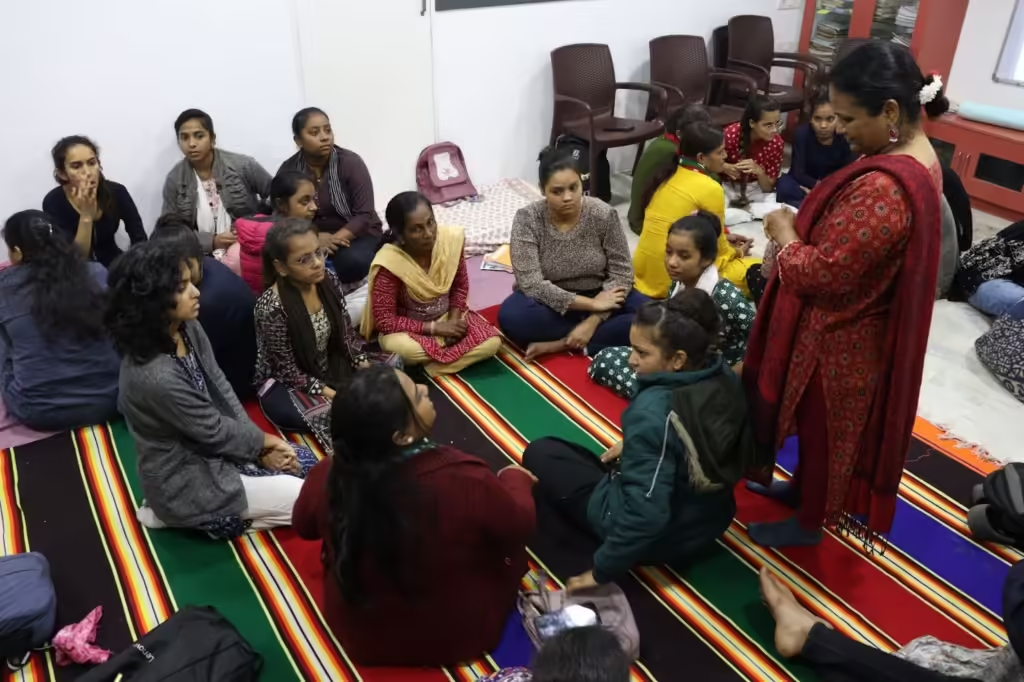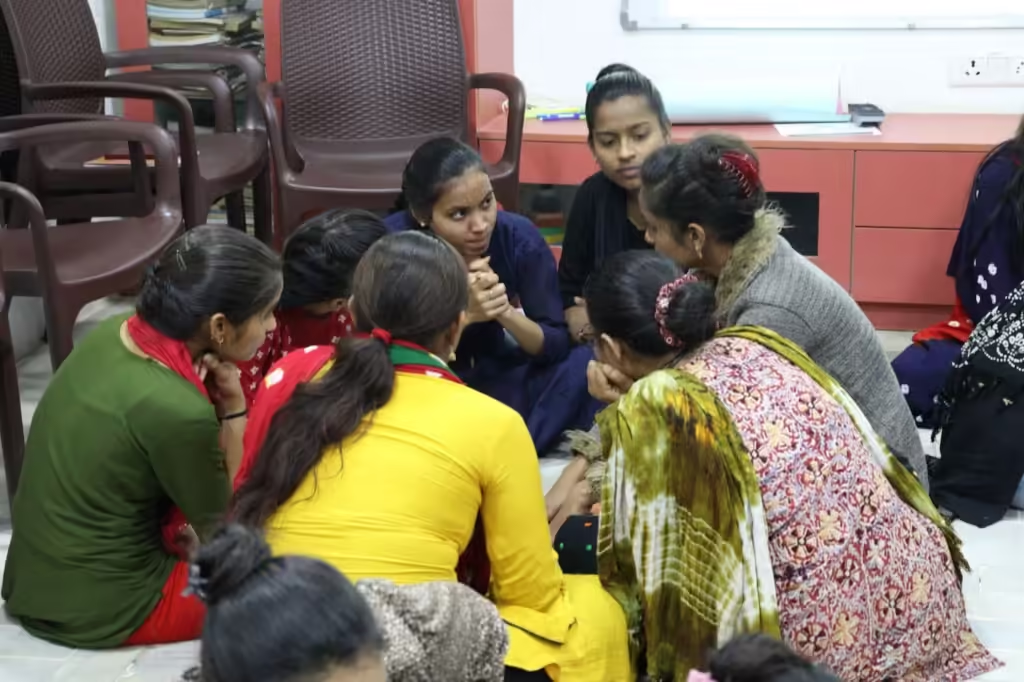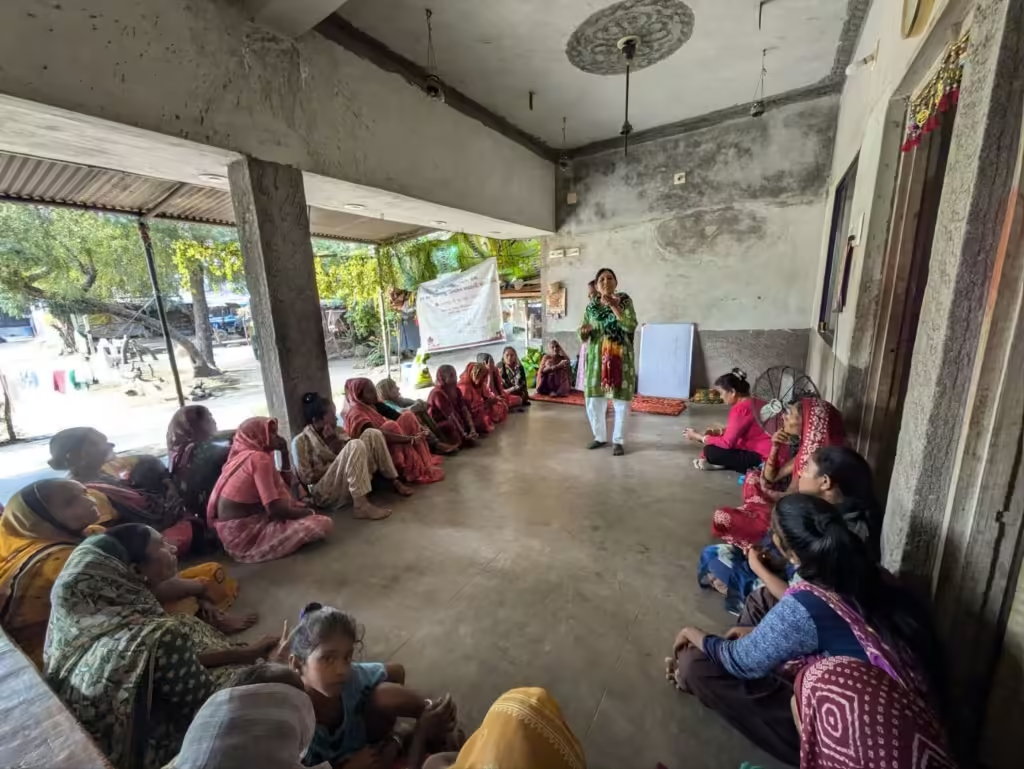
Introduction: Young workers at a crossroads
In today’s changing world of work, youth participation in cooperatives has become both a challenge and an opportunity. Many young workers–especially women entering the workforce–find themselves caught between two visions of economic life: one shaped by individual ambition, and another built on collective strength. Within the mainstream market, cooperatives can seem like an anomaly, yet they remain vital spaces for inclusive and sustainable livelihoods.

Youth Participation in COoperatives and the question of relevance
At SEWA Cooperative Federation, youth participation in cooperatives is being nurtured through Srujan Pre-cooperative–a space created to prepare SEWA’s next generation of members to lead in new and dynamic ways.
Srujan focuses on building communication, business, and digital skills among young women – many of the daughters of SEWA’s first generation members who have grown up witnessing the power of collectivisation. So far, it has mobilised over 770 young women through training, exposure visits, and sector-based assignments with cooperatives across Gujarat.
However, participation has not been without challenges. Many young people are drawn to the “organised market” and white-collar jobs, seeking stability, recognition, and income growth. As one senior SEWA member shares, “We work on the issues of our sisters and their cooperatives on the ground. But with society evolving, we must evolve too–taking the market and young people’s aspirations into account.”
This highlights a key tension–how cooperatives can remain relevant to a generation that values both purpose and personal growth.

Negotiating between the market and the movement
Cooperatives today must constantly balance two logics: the collective good and the market imperative. As cooperatives grow and diversify, trust and participation can no longer be assumed–they must be consciously built. This involves creating systems that reward contribution, recognise leadership, and embed ownership at every level.
Globally too, there are ongoing efforts to ensure that young people find meaningful spaces within cooperatives. The ICA Youth Network has been advocating for stronger youth engagement and leadership within the cooperative movement worldwide – encouraging exchange, capacity building, and intergenerational cooperation.
At the same time, exposure to digital markets and gig work brings new pressures. The mainstream economy rewards efficiency and self-interest, often sidelining cooperative principles like Democratic Member Control or Concern for Community.
Rather than resisting ambition, cooperatives must learn to channel it. The real question is not whether to engage with the market, but how to do so without losing the cooperative spirit. At SEWA Cooperative Federation, this approach forms part of our Women’s Enterprise Support System (WESS)–a model that aligns individual success with collective progress. Instead of treating solidarity as a moral ideal, it is built into the design of cooperative business models, incentive systems, and decision-making processes.
Grounded Innovation: The case of vatrak women farmers’ cooperative
The Shree Vatrak Women Farmers Cooperative (earlier known as Kheda Women Farmers Cooperative) in Gujarat demonstrates how cooperatives can adapt to new economic realities while staying true to their values.
Initially formed in the 1990’s and revived in 2011, the cooperative helios women farmers manage agricultural production, marketing, and access to government schemes. One of its key innovations has been Krishi Suvidha Kendras (KSK’s)–community-run agricultural resources centres that stock essential inputs locally.

By bringing farm supplies closer to villages, these centres save women long, costly trips and help reduce time poverty. When logistical barriers rose, cooperative leaders introduced decentralised models–such as micro-centres operated from members’ homes with shared profit arrangements.
This blend of entrepreneurial thinking and collective accountability shows how cooperative models can revolve without losing their democratic foundation.
Redefining Success: From Individual to collective
Working across agriculture, handicrafts, health, childcare, and home-based enterprises, SEWA Cooperative Federation has learned that youth inclusion requires flexibility, dialogue, and trust. There is no one-size-fits-all approach–but across sectors, the core principles remain constant: ownership, equality and voice.
As Mittalben, Ex-Managing Director, SEWA Cooperative Federation, shares, “SEWA is not one person–it is an idea, an ideology, a movement, a way of life. It can take root anywhere, it can be replicated anywhere.”
For young people–especially those entering uncertain labor markets–cooperatives can offer a model of enterprise that values fairness, dignity and shared prosperity. They represent a bridge between traditional solidarity and modern innovation.
The future of cooperatives will depend on their ability to speak dual language: of innovation and inclusion, ambition and belonging. If young workers can see cooperatives not as the opposite of the market, but as its ethical reimagining–where profit meets purpose–then solidarity will not be a relic of the past. It will be the foundation of the future.

